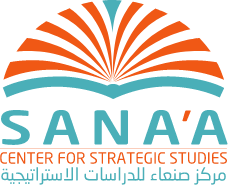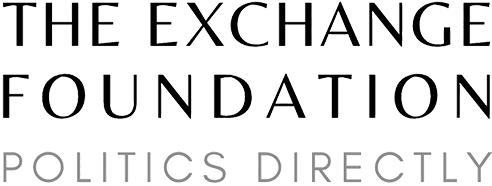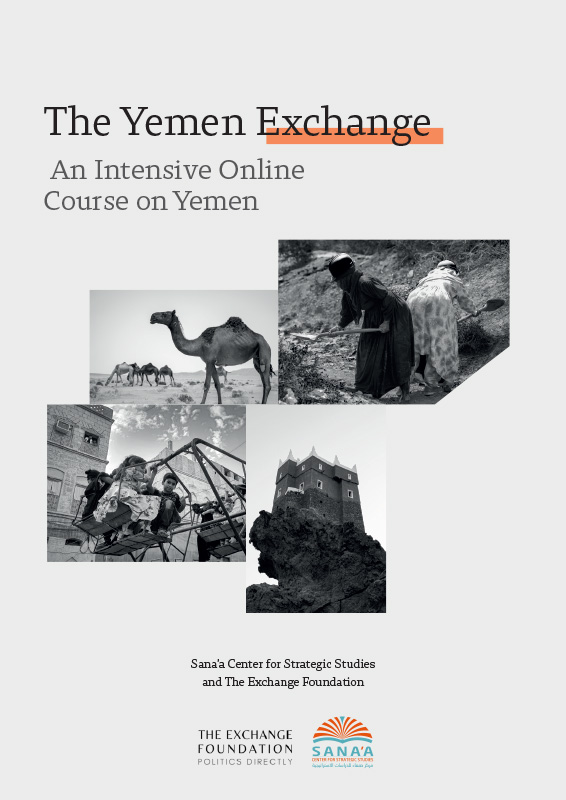February 28 - March 11, 2022
The Eighth Yemen Exchange is an intensive online version of the Yemen Exchange organized by the Sana’a Center and The Exchange Foundation. The course is designed to provide unique access to information, perspectives, updates and analysis on Yemen for both those seeking to develop a working background on the country as well as those already thoroughly versed in its dynamics. During the ten-day program conducted online, participants from around the world will listen to Yemeni analysts, academics, politicians, bureaucrats, business leaders and international experts to gain insight and rare first-hand knowledge about the country from a wide range of perspectives. Participants will have the chance to both virtually engage with speakers during the sessions and connect with speakers individually after the Exchange.
The sessions themselves – totaling more than 30 hours – will dive into several specific areas, including but not limited to: Yemen’s multifaceted conflicts, socio-political dynamics, internal divisions and alliances among parties to the conflict, developments in the southern governorates and the Red Sea, military and political developments on the ground, the status of various armed groups, gender issues, the Yemeni diaspora, the regional battle for Yemen, the humanitarian response, the state of the economy, the UN-led peace process and a variety of other topics.
-
18:00 - 21:00 Sana’a / 10:00 - 13:00 ESTYemen for BeginnersSana’a Center researchers
-
16:00 - 17:45 Sana’a / 08:00 - 09:45 ESTWelcome, introduction and course rulesThe Exchange team
-
18:00 - 19:30 Sana’a / 10:00 - 11:30 ESTWho is fighting whom, where, and why?Via maps and other visuals, this session will be a deep dive into political alliances, divisions and conflicts within Yemen. Analysts will elaborate on current frontlines, armed groups and local and regional actors as well as other stakeholders and unexplored roots of the war.
The panel will be further refined based on the input and needs of accepted participants.Maged Al-MadhajiCo-founder and executive director of the Sana’a Center and regular commentator on Yemen for Arabic media.Abdulghani Al-Iryanisenior researcher at the Sana’a Center. Prior to joining the Sana’a Center, Al-Iryani was a political and development advisor for many INGOs and international organizations in Yemen, including the Office of the UN Special Envoy for Yemen, UNDP and the World Bank.Ghaidaa Al-RashidyResearcher and visual data specialist at the Sana’a Center.
-
16:00 - 17:00 Sana’a / 08:00 - 09:00 ESTThe Houthis from an academic perspectiveMaysaa Shujaa Al-DeenNon-resident fellow at the Sana’a Center, where her research focuses on religious sectarianism, political transformation and Yemen’s geopolitical role in the region.Emanuel SchaeublinAnthropologist for the Mediation Support Team at the Center for Security Studies (ETH Zurich) and member of the Sana’a Center Geneva Association.Facilitator
-
17:15 - 18:15 Sana’a / 09:15 - 10:15 ESTThe Salafis from an academic perspectiveLaurent BonnefoyResearch fellow at the French National Center for Scientific Research (CNRS) and author of Salafism in Yemen: Transnationalism and Religious Identity, (London: Hurst, 2011).Amjad KhoshafaA journalist and researcher focusing on Salafist groups in Yemen.Abubakr al-ShamahiResearcher and deputy chief editor at the Sana’a Center.Facilitator
-
18:30 - 19:30 Sana’a / 10:30 - 11:30 ESTAQAP & the Islamic State in YemenUsing maps and other visuals, this session will cover the status and activities of non-state armed groups currently active in Yemen’s civil war, including Al-Qaeda in the Arabian Peninsula and ISIS, and their role in post-war Yemen as well as foreign counterterrorism operations inside Yemen.Elisabeth KendallSenior Research Fellow in Arabic and Islamic Studies at Pembroke College, Oxford University, and member of the Sana’a Center’s Advisory Board.Yemeni ResearcherA Yemeni journalist and researcher specializing in Al-Qaeda in YemenYasmeen al-EryaniDirector of Research at the Sana’a Center and a Ph.D. candidate in Social Anthropology at Tampere University.Facilitator
-
16:00 - 17:00 Sana’a / 08:00 - 09:00 ESTStatus and reserves of the Yemeni rialMansour RagehDeputy Governor of the Central Bank of Yemen.Osamah al-RawhaniDeputy Executive Director of the Sana’a Center and expert in the field of peace and conflict resolution.Facilitator
-
17:15 - 18:45 Sana’a / 09:15 - 10:45 ESTThe state of the economyThis session will examine current and post-war challenges facing Yemen’s economy, analyze how this war is in many ways an economic one, and introduce possible economic frameworks for post-war Yemen.The Sana’a Center economists
-
16:00 - 16:45 Sana’a / 08:00 - 08:45 ESTYemen's power sector.Rafat al-Akhalifellow at Oxford University’s Blavatnik School of Government and former minister of youth and sports in Yemen.Magnus FitzResearcher and project officer at the Sana’a Center.Facilitator
-
17:00 - 18:00 Sana’a / 09:00 - 10:00 ESTYemen’s petroleum companyAmmar al-AulaqiExecutive General Manager of Yemen Petroleum Company.Holly TophamProgram manager at the Sana’a Center.Facilitator
-
18:15 - 19:15 Sana’a / 10:15 - 11:15 ESTYemen’s natural resourcesIsmail al-JanadFormer Chairman of the Public Authority for Geological Survey and Mineral Wealth.Faryal Al-NaseemCivil engineer and activist in the community in several youth and cultural initiatives.Facilitator
-
16:00 - 17:00 Sana’a / 08:00 - 09:00 ESTYemeni diaspora perspectivesZaid NagiCommunity organizer and vice president of the Yemeni American Merchants Association.Baligh al-MekhlafiYemeni diplomat to Cairo.Solenn al-MajaliNon-resident fellow at the Sana’a Center, focusing on the Yemeni diaspora.Facilitator
-
17:15 - 18:15 Sana’a / 09:15 - 10:15 ESTHumanitarian aid in YemenSarah VuylstekeResearcher and former Access Coordinator for the World Food Programme. She recently authored the Sana’a Center report series “When Aid Goes Awry.”Tbd.Nawal al-MaghafiBBC correspondent and award-winning filmmaker.Facilitator
-
18:15 - 19:00 Sana’a / 10:15 - 11:00 ESTWater and qatHelen LacknerResearch associate at SOAS University of London and visiting fellow at the European Council for Foreign Relations.Musaed AklanCivil engineer and scientific researcher on water and the environment.Hadil al-MowafakResearch Fellow at the Yemen Policy Center.Facilitator
-
16:00 - 17:00 Sana’a / 08:00 - 09:00 ESTUAE policy in YemenEbtesam al-KetbiPresident and founder of the Emirates Policy Center.Thuraya DammajJournalist, prominent activist and founder and director of the Future Media Foundation.Facilitator
-
17:00 - 18:00 Sana’a / 09:00 - 10:00 ESTSaudi policy in YemenMohamed al-JaberSaudi Ambassador to Yemen.Jamila Ali RajaaChair of the Sana’a Center advisory board. he is a former Yemeni diplomat and has worked as an ambassador, senior analyst, lecturer and policy consultant for the UN and European foreign agencies.Facilitator
-
18:15 - 19:30 Sana’a / 10:15 - 11:30 ESTThe regional fight for YemenMustapha NomanFormer Yemeni diplomat who served as an ambassador in several countries and as Deputy Foreign Minister.Thomas JuneauNon-resident fellow at the Sana’a Center and assistant professor at the Graduate School of Public and International Affairs, University of Ottawa, focusing on Iran and Yemen.Sama’a al-HamdaniNon-resident fellow at the Middle East Institute and analyst for several Arab and Western media outlets and think tanks, focusing on political dynamics in Yemen.Facilitator
-
16:00 - 17:15 Sana’a / 08:00 - 09:15 ESTThe UN-led peace processOffice of the Special Envoy for Yemen (OSESGY)Waleed al-HaririDirector of the Sana’a Center’s US office and fellow-in-residence at Columbia Law School Human Rights Institute.
-
17:30 - 18:45 Sana’a / 09:30 - 10:45 ESTYemen and the EUEU Ambassador to YemenJean-Marie SafaFrench Ambassador to Yemen.Peter Derrek HofDutch Ambassador to Yemen.Shams ShamsanProject manager at the Sana’a Center.Facilitator
-
16:00 - 17:00 Sana’a / 08:00 - 09:00 ESTDevelopments in ShabwaSana’a Center researchers
-
17:15 - 18:15 Sana’a / 09:15 - 10:15 ESTUpdate from AdenHussam RadmanSana’a Center researcher, focusing on southern politics and armed groups.Ghaidaa al-RashidyResearcher and visual data specialist at the Sana’a Center.Facilitator
-
18:15 - 19:15 Sana’a / 10:15 - 11:15 ESTLocal and tribal politics in Mahra and SocotraAhmed NagiNon-resident scholar at the Carnegie Middle East Center.Casey CoombsResearcher at the Sana’a Center and independent journalist. He was based in Yemen between 2012 and 2015.Facilitator
-
16:00 - 19:15 Sana’a / 08:00 - 11:15 ESTPolitical representatives dayTbd.Tbd.Facilitator
-
16:00 - 17:00 Sana’a / 08:00 - 09:00 ESTThe role of tribal women in mediating conflictRim MugahedSana’a Center researcher and project manager, focusing on tribes and political parties.Ahmed al-AramiDirector of the Arabia Felix Center for Studies.Bilqees al-LahabiResearcher at the Sana’a Center, focusing on political and social developments in Yemen. Al-Lahbi has more than 15 years’ experience in research, civil society, development and project management.Facilitator
-
17:15 - 18:15 Sana’a / 09:15 - 10:15 ESTThe current state of Yemen’s tribesSheikh Hussein al-AwadhiTribal sheikh and former governor of al-Jawf.Nabil Al-BashaTribal sheikh and member of Parliament.Nadwa al-DawsariConflict analyst and non-resident scholar at the Middle East Institute, focusing on Yemen’s tribes.Facilitator
-
18:15 - 19:00 Sana’a / 10:15 - 11:00 ESTEvaluation and Q&ASana’a Center for Strategic Studies
All costs related to The Yemen Exchange are funded by participant fees, except for scholarships provided by both organizations (see below). There is no supplementary government or private sector support, a fact that allows us to assure participants of a relatively independent platform for the exchange of information, open dialogue and understanding.
All sessions are held under the Chatham House Rule, with some sessions consisting of only one speaker in order to assure as open and unfiltered a discussion as possible in the context of sensitive topics. Simultaneous translation to English and Arabic will be provided.
Prior to the beginning of the course, accepted participants will receive a course syllabus and the final agenda. Throughout the course, necessary agenda updates will be communicated with the participants on a daily basis. Those interested will also be connected with the experts and speakers to follow up with them for their own work and research, subject to the latter’s approval.
Applying for a scholarship – The Yemen Exchange currently has five scholarships (covering the conference fee) available for researchers who will deepen the social, political and geographic diversity of the Exchange and who can demonstrate both a lack of institutional or self-funding ability and a deep interest in Yemen. For any questions related to scholarships, email [email protected].



